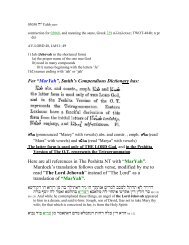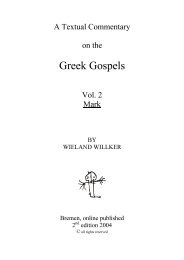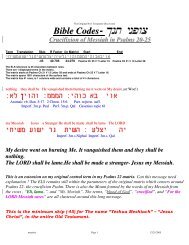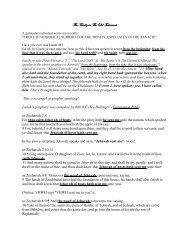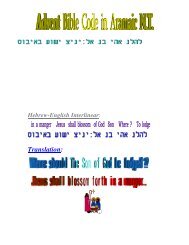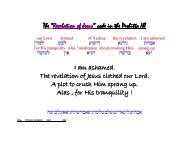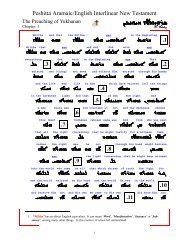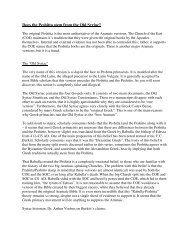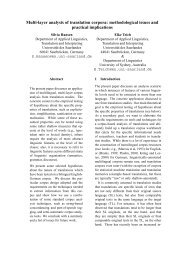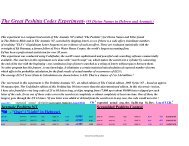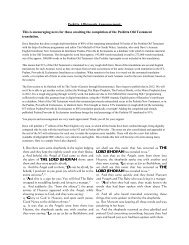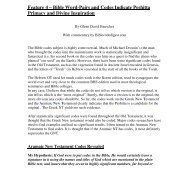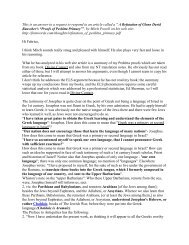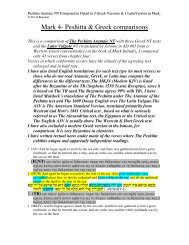Philosophy of Translation - Aramaic New Testament
Philosophy of Translation - Aramaic New Testament
Philosophy of Translation - Aramaic New Testament
Create successful ePaper yourself
Turn your PDF publications into a flip-book with our unique Google optimized e-Paper software.
##<br />
#<br />
<strong>Philosophy</strong> <strong>of</strong> <strong>Translation</strong><br />
“For the words that you gave me I have given them, and they have received them<br />
and known truly that I have proceeded from unity with you.” John 17:8<br />
“The words that I speak with you are spirit and life.” John 6:63<br />
“Father, hallow them in Your truth, because Your Word is The Truth”. John 17:17<br />
But as it is written: "Eye has not seen, ear has not heard, and upon the heart <strong>of</strong> man has<br />
not come up that which God has prepared for those who love him.<br />
But God has revealed it to us by his Spirit, for The Spirit searches into everything,<br />
even the depths <strong>of</strong> God.<br />
And who is the man who knows what is in a man except only the spirit <strong>of</strong> the man that<br />
is in him? So also a man does not know what is in God, only The Spirit <strong>of</strong> God knows.<br />
But we have not received The Spirit <strong>of</strong> the world, but The Spirit that is from God, that<br />
we may know the gift that has been given to us from God.<br />
But those things we speak are not in the teaching <strong>of</strong> the words <strong>of</strong> the wisdom <strong>of</strong> men,<br />
but in the teaching <strong>of</strong> The Spirit, and we compare spiritual things to the spiritual.<br />
For a selfish* man does not receive spiritual things, for they are madness to him, and<br />
he is not able to know, for they are known by The Spirit. * (“d’vanphesh” comes from Napsha –“soul”, “self”, “animal life”, and<br />
can mean, “soulish”, “selfish”, “brutish”.)<br />
But a spiritual man judges everything and he is not judged by any man.<br />
For who has known the mind <strong>of</strong> THE LORD JEHOVAH that he may teach him? But<br />
we do have the mind <strong>of</strong> The Messiah.” - 1 Corinthians 2:9-16<br />
“Every writing which is written by The Spirit* is pr<strong>of</strong>itable for teaching, for<br />
correction, for direction and for a course in righteousness,<br />
that the man <strong>of</strong> God will be perfect and perfected for every good work.” 2 Timothy 3:16,17<br />
<strong>Translation</strong> is a tricky business. The translator, to be most effective, needs to know the<br />
meaning <strong>of</strong> the source he is translating and be able to communicate that in the language<br />
<strong>of</strong> the audience. <strong>Translation</strong> <strong>of</strong> scripture is much trickier than translation <strong>of</strong> the words <strong>of</strong> man, as a<br />
theological-philosophical component exists not encountered in secular sources, for what human can know the meaning <strong>of</strong><br />
the mind <strong>of</strong> God? It is not simply a matter <strong>of</strong> knowing two human languages; it is a matter <strong>of</strong> knowing the infinite mind<br />
<strong>of</strong> Deity and interpreting and conveying it to humans.<br />
“And who shall be worthy for these things?”, wrote Paul The Apostle,<br />
“For we are not like others who blend the words <strong>of</strong> God, but according to that which is<br />
in the truth and according to that which is from God, before God in The Messiah we<br />
speak”. 2 Corinthians 2:16,17<br />
In his second letter to the Corinthians, speaking <strong>of</strong> ministering the word <strong>of</strong> God, Paul wrote:<br />
“But in this way we have trust in The Messiah toward God,<br />
not that we are sufficient to think anything as from ourselves, but our power is from<br />
God, He who made us worthy to be Ministers <strong>of</strong> The ew Covenant, not in The Scripture, but in The Spirit, for The<br />
Scripture kills, but The Spirit gives life.”- 2 Corinthians 3<br />
All the above translations are from this translation -The Original <strong>Aramaic</strong> ew <strong>Testament</strong> in Plain English, by David<br />
Bauscher.<br />
The Bible is a paradox among all literature. It is a book, or collection <strong>of</strong> books which says that mere words cannot convey<br />
truth <strong>of</strong> themselves, only error and death, and that The Spirit <strong>of</strong> God alone is Truth and Life. So the Bible is the written<br />
word <strong>of</strong> God which cannot be known by mortal minds. Only God Himself can convey it, and it must also be received by<br />
a spiritual mind like God’s mind (Refer back to 1 Cor. 2:16)<br />
Effective Bible translation, then, must be primarily the work <strong>of</strong> The Holy Spirit executed through a human instrument, To<br />
some extent, effective translation depends on the inspiration <strong>of</strong> God as did the writing <strong>of</strong> the original scriptures, though<br />
not to the same extent, <strong>of</strong> course.<br />
The translation will invariably contain errors, as the target language will not exactly convey the meaning <strong>of</strong> every original
word or phrase. That kind <strong>of</strong> error is unavoidable and part <strong>of</strong> the confusion <strong>of</strong> languages which God decreed upon the<br />
world at Babel, as recorded in Genesis 11.<br />
If the reader or hearer has The Spirit <strong>of</strong> God within, then The Spirit can bridge the language gap, and what is more<br />
important, the mind gap, between God and man.<br />
This translation is not perfect; I really don’t believe there is such a thing as a perfect translation <strong>of</strong> The Bible. I do believe,<br />
as Paul, that “we are not sufficient to think anything as <strong>of</strong> ourselves, but our power is from God.”<br />
I can honestly say that while translating the <strong>New</strong> <strong>Testament</strong>, I experienced Divine help,<br />
power and inspiration all the way through. I am reasonably skilled at learning languages,<br />
but I was an apprentice watching his Master taking me through the process <strong>of</strong> using<br />
<strong>Aramaic</strong> vocabulary and grammar to unveil His Mind and Heart in the English language.<br />
I was “along for the ride”, as it turns out.<br />
Because <strong>of</strong> my novice status as an <strong>Aramaic</strong> scholar (about 8 years), I actually have greater confidence<br />
in the results than I might have had if I were a native Aramaean, as George Lamsa was,<br />
speaking <strong>Aramaic</strong> fluently. Lamsa did not need to rely on God nearly as much as I did,<br />
and, frankly, I think the resulting translation shows that to be true.<br />
This reveals another paradox.<br />
What men call expertise, superior ability and learning, <strong>of</strong>ten prove to be a disappointment and lose the contest to the<br />
upstart and underdog who had tremendous challenges to overcome and who went beyond his own capacity and resources<br />
to conquer those challenges.<br />
“The race is not to the swift, nor the battle to the strong.” – Ecclesiastes 9:11<br />
The Old <strong>Testament</strong> teaches this principle very well: “And Saul said to David, ‘You are not able to go against this<br />
Philistine to fight with him: for you are but a youth, and he a man <strong>of</strong> war from his youth.’” 1Sa 17:33<br />
But we know what happened; though the odds seemed a hundred to one against David, he killed Goliath, for as he said:<br />
“The LORD does not save with sword and spear, for the battle is The LORD’s, and He will deliver you into our<br />
hands.”<br />
The Apostle Paul wrote that scripture is <strong>of</strong> The Spirit <strong>of</strong> God and must be understood<br />
with the aid <strong>of</strong> The Spirit Who authored scripture. Reading scripture without The Spirit<br />
can kill a person!-( “for The Scripture kills”) Interpret that as you will; the point is that we must have The Holy Spirit to<br />
speak to us directly in order to understand scripture and receive spiritual life. This principle applies to a translator as well<br />
as to every reader <strong>of</strong> scripture.<br />
Knowledge <strong>of</strong> a language can be a hindrance to properly translating scripture. Let me explain. A person who speaks<br />
<strong>Aramaic</strong> fluently (which I do not, nor did Murdock or Etheridge) may trust in his knowledge <strong>of</strong> the language and may not<br />
feel a need to seek God’s help and trust Him to guide him in the translation. Thus his knowledge <strong>of</strong> the language would be<br />
a serious impediment and mitigate the spiritual nature and accuracy <strong>of</strong> the translation. I know that sounds like a<br />
contradiction, and I am not arguing that greater knowledge <strong>of</strong> the language is undesirable, only that it can be a stumbling<br />
block. It does not need to be, and should not be so.<br />
But ask yourself this question: How many translations <strong>of</strong> The Bible were done by native speakers <strong>of</strong> Hebrew or Greek?<br />
One would think, for example, that the Greek <strong>New</strong> <strong>Testament</strong> would be best translated by Greeks who grew up speaking<br />
Greek and also know English.<br />
I know <strong>of</strong> no such translation that is commonly used in the churches.<br />
How can this be, that none <strong>of</strong> the known translations <strong>of</strong> the Greek N.T. is done by native Greek speakers? I submit that it<br />
is a testament (pun unintended) to human nature.<br />
Translators fluent in the language tend to trust in their fluency, in their translation <strong>of</strong> a<br />
spiritual and Divine text; those who study the language in adulthood are less inclined to<br />
be over confident in their ability and more inclined to seek Divine help and to emphasize the spiritual element rather than<br />
the linguistic component in translating the Bible text.<br />
Sound understanding <strong>of</strong> a language is <strong>of</strong>ten insufficient in determining the original<br />
meaning <strong>of</strong> scripture, especially when so many words have several different meanings<br />
which may make sense in a particular scriptural context.<br />
Here is how I applied this principle to my translation <strong>of</strong> The Peshitta <strong>New</strong> <strong>Testament</strong>: I<br />
was always asking myself, “What is God saying to me here? How does this speak to<br />
my spirit?” Very <strong>of</strong>ten, there are several different meanings for an <strong>Aramaic</strong> word or
phrase, as is the case with English and all languages. Of course, a spirit <strong>of</strong> prayer is the<br />
only spirit in which to approach the holy task <strong>of</strong> translating the very words <strong>of</strong> The Living God, and it was in that spirit and<br />
in His Spirit I believe I did approach my task, from start to finish. I did perceive powerful Divine guidance, inspiration,<br />
help and confidence in the work. That does not mean I did perfect work, as I know there are errors <strong>of</strong> all sorts in the<br />
translation. What it does mean, as I see it, is that God is pleased with the results and that this translation effectively<br />
represents His intended meaning and purpose in writing to us in the first century through His Apostles and Evangelists.<br />
Some look for a translation by one fluent in the source language, i.e. <strong>Aramaic</strong>, as an indication <strong>of</strong> the trustworthiness <strong>of</strong><br />
the translation. Ignoring the issue <strong>of</strong> the target language, let’s focus on the matter <strong>of</strong> fluency. Fluency generally pertains to<br />
the speaking <strong>of</strong> a language, nothing more. We must consider the matter <strong>of</strong> literacy first and foremost, when discussing<br />
translation <strong>of</strong> a language. A four year old American boy may be a fluent English speaker, but most likely would be<br />
illiterate-i.e., he cannot read or write English, or any other language. The success <strong>of</strong> translating a written source per se is<br />
dependent on the ability <strong>of</strong> the translator to read and understand the source language, not on ability to speak it. He or she<br />
must learn the grammar, vocabulary, sentence structure and idioms <strong>of</strong> the language.<br />
Consider that Josephus wrote his Antiquities and Jewish Wars in <strong>Aramaic</strong> and later translated them into Greek. He also<br />
wrote in his Greek translation <strong>of</strong> Antiquities that he could not speak Greek well enough to converse in it. This was<br />
because Greek was not his native tongue and he was so used to speaking with his countrymen in <strong>Aramaic</strong> and not hearing<br />
Greek, that he never became fluent in Greek. He was quite literate in Greek, however! His Greek writing is excellent,<br />
some <strong>of</strong> the best compositional Koine Greek ever.<br />
Let me now give an example <strong>of</strong> how I approached selecting between different possible<br />
translations <strong>of</strong> a verse <strong>of</strong> scripture: James 2:18<br />
(& to me *) ylw (faith) atwnmyh (to you) Kl (is) tya (to you) Kl (a man) sna (for) ryg (says) rma 18<br />
(works *) adbe (without *) ald (your faith) Ktwnmyh (show me) ynwx (works) adbe (to me) yl (is) tya<br />
(my deeds) ydbe (from) Nm (my faith *) ytwnmyh (to you) Kl (am) ana (showing) awxm (& I) anaw<br />
“For a man says to you, ‘You and I have faith; I have deeds; Show me your faith<br />
without deeds and I shall show you my faith by my deeds.’”<br />
All other translations <strong>of</strong> this verse that I can find start out basically –“Someone says, you have faith, I have works…” The<br />
Greek text has this, as do the translations <strong>of</strong> The<br />
Peshitta <strong>Aramaic</strong> I have read. The <strong>Aramaic</strong> text can be understood to mean “You and I<br />
have faith; I have works”, or “You have faith and I have works”. There is a subtle<br />
difference here, though I believe it is an important one. In the common rendering, it can<br />
sound like James is pitting works against faith, almost as the Law keeping Jews who had no faith in Jesus as The Messiah<br />
may have argued against Christians who did not live by the Law <strong>of</strong> Moses but believed in Jesus for salvation. One could<br />
come away from verse 18 with the idea that James was arguing with The Apostle Paul about “Faith versus works”.<br />
Actually, the context shows that this is not the case, but I believe my rendering is in better agreement with the context<br />
than the conventional translation.<br />
James assumes “You and I have faith”, which is assuming both parties lay claim to faith. It is thus not a dispute between<br />
faith and works, or one group claiming to have faith and another laying claim merely to works; it is two parties both<br />
claiming to have faith. Only one, however, also claims to have works- good deeds. This makes the choice <strong>of</strong> translation<br />
easy for me, as it removes all doubt that James’ position is exactly the same as Paul’s and that he is reinforcing the<br />
necessity <strong>of</strong> faith, but only <strong>of</strong> practical and practicing faith, not <strong>of</strong> a mere claim to faith or a mental exercise called faith.<br />
Another example is in Hebrews 11:1-<br />
Here are two other translations <strong>of</strong> The Peshitta <strong>of</strong> Hebrews 11:1-<br />
“Now FAITH is the persuasion concerning things which are in<br />
hope, as if they were in reality, and a revelation <strong>of</strong> those which are not<br />
seen.” -JOHN WESLEY ETHERIDGE<br />
“Now faith is the substance <strong>of</strong> things hoped for, as it was the substance <strong>of</strong> things<br />
which have come to pass; and it is the evidence <strong>of</strong> things not seen.” –George M. Lamsa<br />
Here is my translation:<br />
(those things) Nylya (concerning) le (the conviction) aoyp (faith) atwnmyh (but) Nyd (is) hytya 11:1<br />
(these things) Nyhl (were) ywhd (it) wh (as if) Kya (in hope) arbob (that are) Nyhytyad<br />
(are seen) Nyzxtm (that not) ald (<strong>of</strong> those things) Nylyad (& the revelation) anylgw (in action *) anrewob<br />
“Now faith is the conviction concerning those things that are in hope, as if it were<br />
these things in action, and the revelation <strong>of</strong> those things that are unseen.”
Needless to say, the translation I have produced is what my spirit hears God’s Spirit<br />
saying in the <strong>Aramaic</strong> text (aside from the fact that the primary sense <strong>of</strong> anrewo -“surana”, is “action“);<br />
it is clear and rings true to me. I could give many such examples in the <strong>New</strong> <strong>Testament</strong>.<br />
I ask the reader to “Explore everything and hold what is excellent.” 1 Thessalonians<br />
5:21<br />
This translation is derived from my <strong>Aramaic</strong>-English Interlinear NT, which is as literal<br />
as a translation can be. There are idioms in <strong>Aramaic</strong>, <strong>of</strong> course; these I highlighted in the color interlinear<br />
editions in purple, though not always translating idiomatically, but usually word for word. Here in this <strong>New</strong><br />
<strong>Testament</strong> in Plain English I have translated most <strong>of</strong> the idioms as such, which makes it much easier to<br />
understand. I have attempted, however, to retain as much <strong>of</strong> the literal sense as is reasonable in English,<br />
though not always in the best English grammar. This is because I am more concerned that the reader get the<br />
benefit <strong>of</strong> the original word order and emphasis, which in Semitic languages<br />
(Hebrew,<strong>Aramaic</strong>,Ethiopic,Arabic) is <strong>of</strong>ten quite different from Western non-Semitic languages. Often,<br />
<strong>Aramaic</strong> will rename a subject or object with a pronoun for emphasis; sometimes this will be translated as<br />
reflexive: “He himself”, “himself”, “themselves”, instead <strong>of</strong> the simple personal pronoun. Sometimes a verb is<br />
doubled or even tripled for emphasis; this may result in: “The sower, who sowed, sowed the word."<br />
–Mark 4:14. The <strong>Aramaic</strong> root “Zara” is used three times in that short verse, once as a noun and two as a verb.<br />
The Greek verse has only one verb and one participle (“the sower”), hence the English translations also have<br />
one verb: “The sower sows the word.” Another example is: “And he stretched his hands toward his<br />
disciples and said, “Behold my mother and behold my brothers!”-Matthew 12:49. The Greek has<br />
simply, “Behold my mother and my brothers.” Not a big difference here, but I have retained the redundant<br />
“behold”, simply because it is there in the <strong>Aramaic</strong> text. Such idiosyncrasies and others are common to<br />
<strong>Aramaic</strong> and Hebrew and are alien to English. It is a difficult balancing act to translate literally and<br />
idiomatically simultaneously, while rendering all in good English grammar as well. I am sure improvements<br />
can be made and will be forthcoming.<br />
So the translation is very literal, yet idiomatic. I have left the English readable, yet rough, to convey the sense<br />
<strong>of</strong> the original as accurately as possible. I hope the reader will forgive the raw style <strong>of</strong> some <strong>of</strong> the translation.<br />
I do believe it better conveys the simplicity and power <strong>of</strong> the Peshitta <strong>New</strong> <strong>Testament</strong>. I believe The <strong>Aramaic</strong><br />
Peshitta is unparalleled in both respects among all <strong>New</strong> <strong>Testament</strong> texts.<br />
Many, no doubt, will still want to know my qualifications for doing this translation and<br />
presenting it as preferable to that <strong>of</strong> others who had studied <strong>Aramaic</strong> longer and were<br />
recognized scholars and pr<strong>of</strong>essors in the field. To such, I present the following from my Original <strong>Aramaic</strong> <strong>New</strong><br />
<strong>Testament</strong> in Plain English:<br />
1 Corinthians 1<br />
26.For you see also your calling my brethren, that not many among you are wise in the<br />
flesh, neither are many among you mighty, neither are many among you children <strong>of</strong> a<br />
great family line.<br />
27.For God has chosen the foolish <strong>of</strong> the world to shame the wise, and he has chosen the weak <strong>of</strong> the world to shame<br />
the mighty.<br />
28.And he has chosen those <strong>of</strong> low descent in the world and the rejects and those who are nothing, to nullify those<br />
who are,<br />
29.That no one will boast before him.<br />
30.But you also are from him in Yeshua The Messiah, he who has become for us the<br />
wisdom <strong>of</strong> God and the righteousness and the holiness and the redemption,<br />
31.According to what is written: "Whoever boasts, let him boast <strong>of</strong> THE LORD<br />
JEHOVAH.”<br />
“Foolish, weak, <strong>of</strong> low descent, rejects, those who are nothing”- I think I have attained those credentials, for I have<br />
chosen to value what Jesus values and have given up my desire to be “somebody” in the world, so that I may follow my<br />
LORD and please Him.<br />
With God’s help, inspiration and encouragement, I have completed two translations <strong>of</strong><br />
the Peshitta <strong>New</strong> <strong>Testament</strong> and am in the process <strong>of</strong> translating the Peshitta Old <strong>Testament</strong>.<br />
I have done a rough translation <strong>of</strong> 5% <strong>of</strong> the 500,000 words <strong>of</strong> The Tanakh (about 25,000 words) in an interlinear<br />
translation. The Psalms should be done soon, which I will publish.<br />
I also can say that I have endeavored always to honor The Triune God, and believe my translation glorifies The Author <strong>of</strong><br />
all scripture:
Alaha Ava, Brah MarYah Yeshua Meshiakha, w’Rookha d’Qoodsha Breeka, Khath<br />
Alaha, Breek lalam almeen. Ameen.<br />
(God The Father, His Son The Lord Jehovah Yeshua The Messiah and The Blessed<br />
Spirit <strong>of</strong> Holiness, One God, Blessed to the eternity <strong>of</strong> eternities. Amen.



